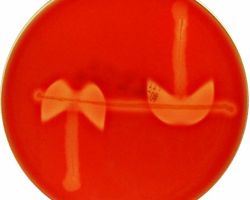SEARCH
Search
CAMP-test revers_Clostridium perfringens
-
General
♦ Revers CAMP test
It can be used for differentiate of Clostridium perfringens from other Clostridium species.
Here a CAMP-revers positive Streptococcus agalactiae is streaked in the center of sheep blood agar, and a Clostridium perfringens is streaked perpendicular to it.
Following incubation at 37ºC for 24-48 hours in anaerobic conditions, an "arrowhead" hemolysis is seen between the growth of Clostridium perfringens and Streptococcus agalactiae.
This is because of alpha toxin produced by Clostridium perfringens interacts with CAMP factor and produce synergistic hemolysis.
-
History
The CAMP factor reaction was first described in 1944 by Christie, Atkins and Munch-Peterson and reverse to the synergistic lysis of erythrocytes by the beta hemolysin of Staphylococcus aureus and the extra cellular CFB protein of Streptococcus agalactiae.
-
Related
-
References
James Versalovic et al.(2011) Manual of Clinical Microbiology 10th Edition
Foto's
MMIZ
ErasmusMC
Roterdam

